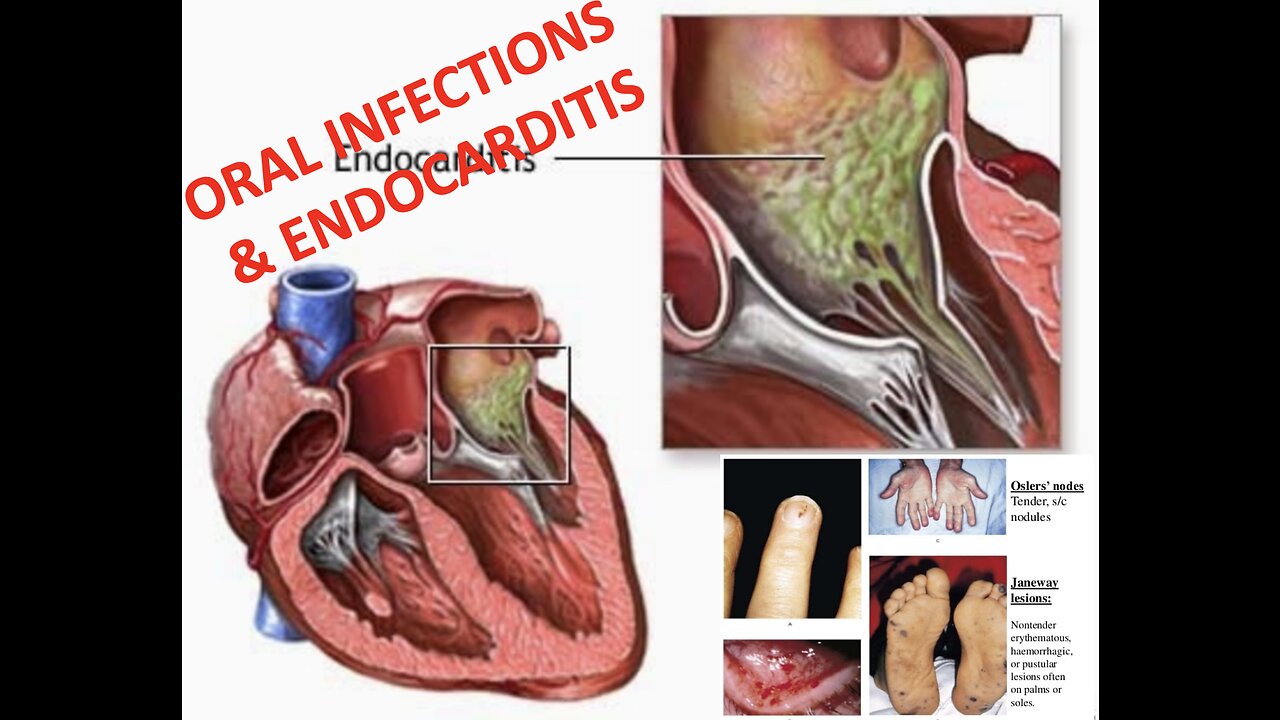Premium Only Content

EXCESSIVE SUGAR, FRUCTOSE, CARB CONSUMPTION & Endocarditis risk
Sugar and carbohydrates can increase plaque and risk of gingivitis, both of which can cause endocarditis in some circumstances.
Plaque is a sticky film of bacteria that can build up on the teeth. If plaque is not removed regularly, it can harden into tartar. Tartar can irritate the gums and lead to gingivitis, which is an inflammation of the gums. Gingivitis can progress to periodontitis, which is a more serious condition that can damage the gums and bone that support the teeth.
If periodontitis is severe, it can cause the gums to recede and expose the roots of the teeth. This can make it more difficult to clean the teeth and can lead to the formation of pockets between the teeth and gums. These pockets can become infected, which can lead to endocarditis.
Endocarditis is an infection of the inner lining of the heart (endocardium). It can be caused by bacteria, viruses, or fungi. The most common cause of endocarditis is bacteria that enter the bloodstream from another part of the body, such as the mouth or skin.
Bacteria from plaque can enter the bloodstream during dental procedures, such as tooth brushing, flossing, or a dental cleaning. If you have gum disease, the bacteria are more likely to enter the bloodstream.
To reduce your risk of endocarditis, it is important to:
* Take good care of your teeth and gums.
* Get regular dental checkups and cleanings.
* Tell your dentist about any heart conditions you have.
* Avoid sharing toothbrushes or other personal items.
* Practice good hygiene, such as washing your hands often.
If you have any concerns about your risk of endocarditis, talk to your doctor. They can help you assess your risk and recommend ways to reduce it.
Endocarditis is an infection of the inner lining of the heart (endocardium). It can cause a number of problems, including:
* Heart valve damage: The infection can damage the heart valves, making them leak or not close properly. This can lead to heart failure.
* Blood clots: The infection can also cause blood clots to form in the heart. These clots can travel to other parts of the body, such as the brain, and cause a stroke.
* Embolism: An embolism is a blockage in a blood vessel caused by a blood clot or other foreign object. An embolism can occur in the lungs, kidneys, or other organs.
* Heart failure: Heart failure is a condition in which the heart cannot pump enough blood to meet the body's needs.
* Death: Endocarditis can be a life-threatening condition, especially if it is not treated promptly.
The symptoms of endocarditis can vary depending on the severity of the infection. Some common symptoms include:
* Fever
* Fatigue
* Night sweats
* Weight loss
* Shortness of breath
* Chest pain
* Joint pain
* Rash
* Petechiae (small red dots on the skin)
If you have any of these symptoms, it is important to see a doctor right away. Early diagnosis and treatment are essential for a good outcome.
The treatment for endocarditis usually involves antibiotics. The type of antibiotics and the length of treatment will vary depending on the type of bacteria that is causing the infection. In some cases, surgery may be necessary to remove damaged heart valves.
With prompt diagnosis and treatment, most people with endocarditis make a full recovery. However, the condition can be serious, and it is important to see a doctor right away if you have any of the symptoms.
-
 LIVE
LIVE
Tundra Gaming Live
6 hours ago $0.36 earnedThe Worlds Okayest War Thunder Stream//FORMER F-16 MAINTAINER//77th FS//#rumblefam
229 watching -
 LIVE
LIVE
DemolitionDx
2 hours agoSunday night COD with friends.
786 watching -
 2:10:14
2:10:14
vivafrei
12 hours agoEp. 237: More Trump Cabinet Picks! MAHA or Slap in the Face? Canada on Fire! Go Woke Go Broke & MORE
154K197 -
 2:23:21
2:23:21
SOLTEKGG
3 hours ago $1.79 earned🟢 First Day on RUMBLE!
21.6K2 -
 LIVE
LIVE
Vigilant News Network
6 hours agoCOVID-Vaccinated Hit With Grave New Reality | Media Blackout
2,254 watching -
 1:26:31
1:26:31
Josh Pate's College Football Show
6 hours ago $1.59 earnedSEC Disaster Saturday | Major CFP Earthquake Coming | Officiating Is A Disaster | New Studio Debut
16.1K1 -
 1:43:05
1:43:05
Adam Does Movies
9 hours ago $0.29 earnedGladiator II Spoiler Conversation With Hack The Movies
19.8K -
 24:10
24:10
Bwian
9 hours agoI Don't Know What I'm Doing in Fortnite, But I Still Won...
15.6K1 -
 19:30
19:30
DeVory Darkins
11 hours ago $3.32 earnedJoe Rogan MOCKS The View as Bill Maher HUMILIATES Woke Scientist
90.4K122 -
 11:25:41
11:25:41
Scottish Viking Gaming
13 hours agoSUNDAY FUNDAY | Jump into my Sons of the Forest Game | DOO EET NOWWA!
90.2K1